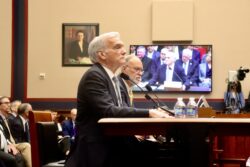First-years, gripping and grinning next the salad bar, meet University President John J. DeGioia in the Leo O’Donovan dining hall during New Student Orientation. Graduating students see him once again as they accept their diplomas. But how much time do students spend discussing campus issues with the University’s chief executive in the intervening four years?
“[DeGioia] is respected,” GUSA President Twister Murchison (SFS ‘08), who encouraged the President to be more available in his campaign platform, said. “But students would like more of a chance to get to know him the general perception is that they would prefer more open meetings.”
DeGioia, like most university presidents, is responsible for more than just the undergraduate education—he also supervises the assorted graduate schools, acts as the chief fundraiser for the University and broadly oversees the University’s vision. Despite his numerous responsibilities, he does make efforts to reach out to undergraduates, according to University spokesperson Eric Smulson.
DeGioia hosts a yearly town hall meeting with students to address their concerns, and two for faculty, according to Smulson. DeGioia also meets once yearly with members of the student press, sits down occasionally with GUSA leadership, teaches a class, and hosts the well-attended Pacem in Terris lecture series. Like at most universities, however, most direct interaction with students is handled by other administrators and deans.
But at many other Universities, presidents manage to have more contact with members of the undergraduate population. At the University of Pennsylvania, President Amy Gutmann speaks weekly with the student press, attends public University Council meetings monthly and meets regularly with student groups, according to Ross Avila, a Penn sophomore who covers the president for the Daily Pennsylvanian, the University’s student newspaper.
At Harvard University, former President Larry Summers, who was noted for his popularity among students despite well-publicized clashes with faculty, held monthly open office hours for students and attended a social function at every Harvard residence yearly, according to student government President John Haddock. Other universities whose presidents hold open office hours include George Washington and Rice.
At this year’s only town hall meeting in January, DeGioia fielded questions from approximately 50 students on topics ranging from the controversy surrounding the Palestinian Solidarity Movement conference on campus to the Living Wage Campaign. Emily Napalo (COL ‘06), a member of the Georgetown Solidarity Committee who attended the meeting to ask DeGioia about the Living Wage campaign, said she was pleased with the president’s engagement but wanted to see him in this format more often.
“It has to be an available framework,” she said. “I think it should be reserved for pressing issues, but in a dynamic student body there are always going to be pressing issues, and they cannot be tabled until the one time in the year that the president is willing to have open office hours.”
The GSC later had a birthday party-style public demonstration complete with cake and balloons in an attempt to meet with DeGioia. While they did not see DeGioia that day, they did secure a meeting with him and a University worker a few weeks later after repeated requests.
“Here is literally the highest paid man in the University with probably the lowest paid woman, having a conversation with her, which I think is remarkable,” Napalo said. “I don’t think that’s how he normally meets students’ concerns, though.”
Some students wonder how effective open office hours with the President would be.
“The question is, would they make any difference?” Jonathan Aires (SFS ‘06), a member of Hillel, a Jewish campus group that met with DeGioia earlier in the semester, one of the few student groups to meet with the President recently. “I’d like them to be more frequent. That being said, I think the ideal thing would be for groups of students to sit down with him and figure out what the best way is to engage with students.”
Students who have interacted with DeGioia in the classroom note that he is an excellent and committed teacher, though, they say, he only lectures during half of the weekly class, and campus affairs are not discussed.
Smulson, the University spokesman, noted in an e-mail to The Voice that DeGioia mentored students “in a variety of leadership roles, from residence hall director, to dean of students, to professor, to senior vice president to president of the university.”
“I think he should know the needs and wants of students,” Darwin Young (NHS ‘08), who is taking DeGioia’s class, said. “And perhaps the best way to do that is to build a relationship with the student body. At the same time I realize the bulk of his work is dealing with the whole organization, so there has to be a balance.”



